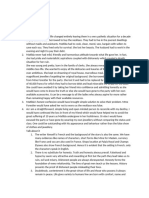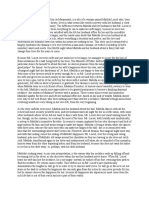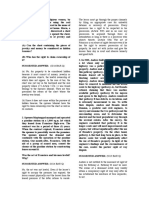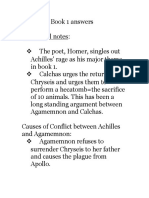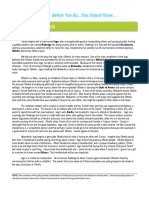0 ratings0% found this document useful (0 votes)
5 viewsNECKLACE (1)
NECKLACE (1)
Uploaded by
DHYANA VCopyright:
© All Rights Reserved
Available Formats
Download as DOCX, PDF, TXT or read online from Scribd
NECKLACE (1)
NECKLACE (1)
Uploaded by
DHYANA V0 ratings0% found this document useful (0 votes)
5 views3 pagesCopyright
© © All Rights Reserved
Available Formats
DOCX, PDF, TXT or read online from Scribd
Share this document
Did you find this document useful?
Is this content inappropriate?
Copyright:
© All Rights Reserved
Available Formats
Download as DOCX, PDF, TXT or read online from Scribd
Download as docx, pdf, or txt
0 ratings0% found this document useful (0 votes)
5 views3 pagesNECKLACE (1)
NECKLACE (1)
Uploaded by
DHYANA VCopyright:
© All Rights Reserved
Available Formats
Download as DOCX, PDF, TXT or read online from Scribd
Download as docx, pdf, or txt
You are on page 1of 3
1.Pen down the character sketch of Matilda.
Matilda is the young and beautiful wife of Mr.Loisel, a clerk in
the board of Education. She is proud of her elegant beauty. She
is unhappy with her poor lot. She thinks she is a victim of social
injustice and irony of fate. She is unhappy with her husband’s
small house and old furniture. She feels she has been deprived
of the comforts and luxuries which she might have enjoyed by
marrying a rich man. In short, she is sick and ashamed of her
present miserable life. But all this does not mean that she does
not love her husband. Of course, she loves him deeply though
much of the credit for this love goes to the husband. He does
his best to make her as happy as he can afford. He puts up with
her foolish demands, and yields to all her stupid whims. Matilda
is a simple, childlike immature girl until she finds herself face to
face with the bitter consequences of her folly. The loss of the
necklace proves a turning point in the development of her
character. It makes her a careful and responsible woman. Her
grumbling over the poor lot of her husband gives way to
respect and gratitude for his tolerance and generosity. Matilda
thus plays two different roles in the story. Before the loss of the
necklace she was thoughtless, ungrateful, proud beauty,
unhappy with the poverty of her husband. After the loss, she
becomes a mature, humble and grateful wife who can gladly
sacrifice every pleasure to get her husband out of his financial
misery. This change in her character makes her a lovable
character in spite of all her faults and follies.
2.Mme Loisel’s disposition invites her doom. Comment
in the context of the text you’ve read.
Mme Loisel belongs to a family of clerks. Her existence is quite
average. They live on meagre income, enough for basic needs
but not to fulfil aspirations. She gets married to a clerk and is
so caught up with her dreams of wealth and pleasure that she
is out of touch with the truths of her real life. In order to keep
up appearances just to flatter her pride, she blows up four
hundred francs on a gorgeous dress. And, not contented, she
goes on borrowing a necklace from her friend. And, all of this is
just to impress the wealthy and the rich with her beauty and
glamour (even if on loan). No doubt, her pride is flattered and
her wish of fine dining, expensive dresses and jewels satisfied
but at a great price. Unfortunately, the necklace has lost and
the couple has to cough up their entire inheritance and borrow
as well to replace it. Repayment of the debt eats away the next
ten years of their youth. They live poor. All the house hold
chores and cares of alife of poverty visit them. Hence, her
disposition invites her doom.
3. Mme Forestier proved to be a true friend. Elucidate.
Mme Forestier turns out to be an interesting character. She
plays a very vital role in the story. As a friend to Matilda, we
find her to be really genuine as she helps Matilda in the hour of
her need. When Mme Loisel needs to borrow jewels, she turns
to Mme Forestier. Mme Forestier does not refuse. Displaying her
generosity, she opens up the entire array of her jewels for
Matilda to choose from. Also, she is considerate when Loisels
delay the return of the necklace. Surprisingly, at the end of the
story, she concludes the entire narrative.
Without even a moment’s hesitation, she reveals to Matilda
that her necklace was just a fake. She is not at all worried in the
light of the fact that she may have to return the necklace. It
shows her honesty. Rather, she, like a true friend, feels bad for
Matilda at her unnecessary suffering. We find her sympathising
with Mme Loisel. She is indeed a gem of a friend.
4.Do you think the story is aptly titled? Justify your
answer.
The whole narrative of the story ‘The Necklace’ revolves around
a young woman Matilda, who in her foolish pride borrows a
necklace inviting misery and sorrow for herself as well as for
her husband. The ‘necklace’ has lost and the Loisels fall into a
tremendous debt. They spend the next ten years of their life in
paying debt for the replacement of the lost necklace. Their
entire life moves around impoverished everyday saga of misery
and hunger and the necklace, in fact, changes the very course
of their life. Also, it is against the back drop of the necklace that
Matilda’s pride and dishonesty are highlighted. At the same
time, the necklace serves a twist at the end as it turns out to be
a fake one. The story is, hence, most aptly titled as the
necklace is, in fact, the leading character of this ironic tale of
desire, the doom and the tragedy.
You might also like
- Ken Burns Prohibition Episode 1Document22 pagesKen Burns Prohibition Episode 1marcus_coleman_5No ratings yet
- Literary Analysis - The NecklaceDocument5 pagesLiterary Analysis - The NecklaceDanny Hoi50% (4)
- 40 Well Kept Secrets of Bar AttorneysDocument2 pages40 Well Kept Secrets of Bar Attorneysjoe100% (5)
- KSRTC BUS TICKETDocument2 pagesKSRTC BUS TICKETchandru100% (3)
- Long Answer Type Questions-1Document2 pagesLong Answer Type Questions-1vishalsinghrathore008No ratings yet
- 3521922-The Necklace - QBDocument5 pages3521922-The Necklace - QBunquiegamer46No ratings yet
- The Diamond Necklace Question & Answer: The Husband's Character in The Short Story "The Necklace"Document2 pagesThe Diamond Necklace Question & Answer: The Husband's Character in The Short Story "The Necklace"Kalpana PalNo ratings yet
- The Necklace by Guy de Maupassant Story OutlineDocument12 pagesThe Necklace by Guy de Maupassant Story OutlineShahzad AliNo ratings yet
- TheNecklace 10QSDocument6 pagesTheNecklace 10QSh00nguy0n-18100% (1)
- The Necklace by Guy de Maupassant (Book Analysis): Detailed Summary, Analysis and Reading GuideFrom EverandThe Necklace by Guy de Maupassant (Book Analysis): Detailed Summary, Analysis and Reading GuideNo ratings yet
- Africa John Ren M. Reaction PaperDocument5 pagesAfrica John Ren M. Reaction PaperMariae Gladys AfricaNo ratings yet
- SR7 The Necklace NotesDocument3 pagesSR7 The Necklace Notespinashah2102No ratings yet
- The Necklace HHWDocument10 pagesThe Necklace HHWRohan MehraNo ratings yet
- Math Chapter 1 CBSE QuestionsDocument5 pagesMath Chapter 1 CBSE QuestionsdaansaiieNo ratings yet
- The Necklace AnalysisDocument5 pagesThe Necklace AnalysisShowket IbraheemNo ratings yet
- The Necklace (Handouts) 21-22Document3 pagesThe Necklace (Handouts) 21-22Mihika MathurNo ratings yet
- Short StoryDocument16 pagesShort Storymohammadadan424No ratings yet
- The NecklaceDocument3 pagesThe NecklaceJoshua PactolNo ratings yet
- THE NECKLACE To Be Mailed.Document7 pagesTHE NECKLACE To Be Mailed.Neeraj BabbarNo ratings yet
- The NecklaceDocument18 pagesThe NecklaceNusrat Bintee KhaledNo ratings yet
- The NecklaceDocument3 pagesThe Necklacekubadepratham12No ratings yet
- The Necklace by Guy de MaupassantDocument31 pagesThe Necklace by Guy de Maupassantgashimoli643No ratings yet
- The NecklaceDocument15 pagesThe NecklaceMagic EleganceNo ratings yet
- Guided Reading The NecklaceDocument9 pagesGuided Reading The NecklaceabdeNo ratings yet
- The NecklaceDocument3 pagesThe Necklacewnikitasoc91No ratings yet
- Summary The NecklaceDocument3 pagesSummary The NecklaceJanice Fuerzas Balmera Curag100% (1)
- The Necklace - CADocument26 pagesThe Necklace - CAMagic EleganceNo ratings yet
- The Necklace by Guy de MaupassantDocument4 pagesThe Necklace by Guy de MaupassantStephanie Cabag-iranNo ratings yet
- Supplementary Reader- The NecklaceDocument1 pageSupplementary Reader- The NecklaceVanesha DmelloNo ratings yet
- The Necklace Class 10 English CBSE Board Literature Help MaterialDocument4 pagesThe Necklace Class 10 English CBSE Board Literature Help MaterialSanvi SinghNo ratings yet
- The Necklace - Extra Questions and NotesDocument48 pagesThe Necklace - Extra Questions and Notesmantraraj1325No ratings yet
- The NecklacsDocument14 pagesThe NecklacsTayyaba AshiqNo ratings yet
- The NecklaceDocument19 pagesThe NecklaceYmel Sario100% (1)
- "The Necklace" Short Story SummaryDocument17 pages"The Necklace" Short Story SummarySule IyibilirNo ratings yet
- The Necklace by Guy de Maupassant NotesDocument7 pagesThe Necklace by Guy de Maupassant NotesFaisal JahangeerNo ratings yet
- NecklaceDocument2 pagesNecklacekv9573468No ratings yet
- Chapter Test 1Document15 pagesChapter Test 1Sarah Jhoy SalongaNo ratings yet
- NecklaceDocument4 pagesNecklaceTjNo ratings yet
- THE Necklace Guy de MaupassantDocument16 pagesTHE Necklace Guy de MaupassantsudhanvaskulkarniNo ratings yet
- The NecklaceDocument3 pagesThe NecklacemrscomputerstrichyNo ratings yet
- The Necklace Extra Questions and Answers Class 10 English Footprints Without FeetDocument8 pagesThe Necklace Extra Questions and Answers Class 10 English Footprints Without Feetshanmuga Priya (Shan)No ratings yet
- The NecklaceDocument9 pagesThe Necklaceayushkumargupta8252No ratings yet
- The Necklace - ReviewerDocument2 pagesThe Necklace - ReviewerHeramis BarbarahNo ratings yet
- CH - 7 THE NECKLACE SummaryDocument3 pagesCH - 7 THE NECKLACE SummaryPranjal RanaNo ratings yet
- The Necklace Character ListDocument2 pagesThe Necklace Character ListAlexie LaraineNo ratings yet
- The Necklace Group 5Document38 pagesThe Necklace Group 5RoseLie Ma Llorca BlancaNo ratings yet
- The NecklaceDocument2 pagesThe NecklaceDina ValdezNo ratings yet
- The Necklace (ENGLISH10)Document1 pageThe Necklace (ENGLISH10)Darie TulioNo ratings yet
- "The Necklace": List of CharactersDocument1 page"The Necklace": List of Charactersranmao1408No ratings yet
- Characters and Theme in "The Necklace" by Guy de MaupassantDocument6 pagesCharacters and Theme in "The Necklace" by Guy de MaupassantMelissa DarmawanNo ratings yet
- NECKLACEpd13102024102647 0Document4 pagesNECKLACEpd13102024102647 0chatgpteconomicsNo ratings yet
- The NecklaceDocument2 pagesThe Necklaceanishverma2601No ratings yet
- Matilde LoiselDocument2 pagesMatilde Loiselmeighenreyes0121No ratings yet
- The Necklace Theme of PrideDocument10 pagesThe Necklace Theme of PrideHelena GunawanNo ratings yet
- The Necklace Detailed SummaryDocument22 pagesThe Necklace Detailed Summarypadhako.harshNo ratings yet
- The NecklaceDocument3 pagesThe NecklaceKaren ArrezaNo ratings yet
- Class 10 English (Footprints Without Feet) The NecklaceDocument8 pagesClass 10 English (Footprints Without Feet) The NecklaceAryan KananiNo ratings yet
- The NecklaceDocument5 pagesThe NecklacesrijandevrariNo ratings yet
- Class 10 Chapter 7 Footprints Without Feet Important QuestionsDocument3 pagesClass 10 Chapter 7 Footprints Without Feet Important Questionsmukeshteghra6005No ratings yet
- The NecklaceDocument15 pagesThe Necklacelidia hilda gomesNo ratings yet
- The Necklace_QB_NRDocument12 pagesThe Necklace_QB_NRsingharpit7014No ratings yet
- APADocument4 pagesAPAAsifurrahman AkashNo ratings yet
- The Diamond NecklaceDocument3 pagesThe Diamond NecklaceBillu RocxNo ratings yet
- The Complete Book of Jewish ObservanceDocument2 pagesThe Complete Book of Jewish ObservanceJose Antonio GarciarivasNo ratings yet
- Lu-vs-Lu-YM-G.R.-No.-153690 Case DigestDocument2 pagesLu-vs-Lu-YM-G.R.-No.-153690 Case DigestKarla ßallesteros100% (1)
- Ios - Expressio Unius Est Exclusio AlteriusDocument8 pagesIos - Expressio Unius Est Exclusio AlteriusShivam Taneja100% (8)
- Property Exam Part 1Document4 pagesProperty Exam Part 1Cacapablen GinNo ratings yet
- Appointment Letter FormatDocument6 pagesAppointment Letter FormatAmit PandeyNo ratings yet
- Bill Cosby RulingDocument79 pagesBill Cosby Rulingdavidtaintor100% (3)
- THE Great CommissionDocument25 pagesTHE Great CommissionJoshua MitchellNo ratings yet
- The Iliad Book 1 AnswersDocument4 pagesThe Iliad Book 1 AnswersJordenn Alexandra Noble100% (1)
- Philconstrust Resources vs. Santiago, G.R. No. 174670, July 26, 2017Document20 pagesPhilconstrust Resources vs. Santiago, G.R. No. 174670, July 26, 2017Harold Q. GardonNo ratings yet
- Secretariate SetupDocument18 pagesSecretariate SetupAR47No ratings yet
- CHV2O.2.Civics Issue Political Significance Assignment OrganizerDocument18 pagesCHV2O.2.Civics Issue Political Significance Assignment OrganizerAva MittoneNo ratings yet
- ChapopoteDocument36 pagesChapopotevanikulapoNo ratings yet
- Moot Memorial - Akash Pandey - FinalDocument11 pagesMoot Memorial - Akash Pandey - FinalAAKASH PANDEYNo ratings yet
- Legal Ethics By: Atty. Megan Daphne D. MusniDocument27 pagesLegal Ethics By: Atty. Megan Daphne D. MusniNelson LaurdenNo ratings yet
- Somethings You Should Know About MARSOCDocument6 pagesSomethings You Should Know About MARSOCMike Invy MatyščákNo ratings yet
- SUA Convention and ProtocolDocument17 pagesSUA Convention and ProtocolAicel Joy100% (1)
- 5Th and 8Th Class English Gramer PDFDocument9 pages5Th and 8Th Class English Gramer PDFQadir RafiqueNo ratings yet
- Chia động từ trong ngoặc - Ôn: thi vào 10Document8 pagesChia động từ trong ngoặc - Ôn: thi vào 10Kỳ LinhNo ratings yet
- InfographicsDocument1 pageInfographicsjoan Claire FajardoNo ratings yet
- 01 Republic Vs CA, 258 SCRA 712Document6 pages01 Republic Vs CA, 258 SCRA 712Louiegie Thomas San JuanNo ratings yet
- Vanessa May Ga 8. PresumptionsDocument6 pagesVanessa May Ga 8. PresumptionsVanessa May Caseres GaNo ratings yet
- Othello Performance SynopsisDocument1 pageOthello Performance Synopsisapi-461350618No ratings yet
- Wisteria Island Ruling, July 31, 2020.Document9 pagesWisteria Island Ruling, July 31, 2020.Gwen FilosaNo ratings yet
- Interview With Mike Durant, Black Hawk Down Pilot, by Toby Harnden, Daily Telegraph 2003Document4 pagesInterview With Mike Durant, Black Hawk Down Pilot, by Toby Harnden, Daily Telegraph 2003Toby HarndenNo ratings yet
- lbbnl0401 1Document2 pageslbbnl0401 1Labor Black BrownNo ratings yet
- A Psychoanalytic-Feminist Study of Gender Bias in Indian CinemaDocument4 pagesA Psychoanalytic-Feminist Study of Gender Bias in Indian CinemaIJELS Research JournalNo ratings yet
- Legres NotesDocument3 pagesLegres NotesGabriella VenturinaNo ratings yet



































